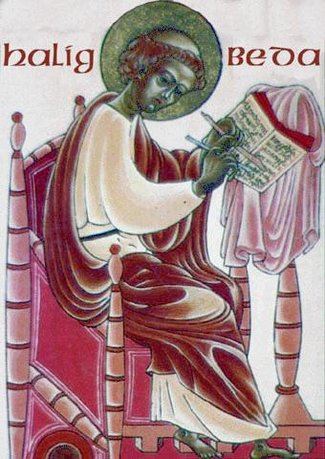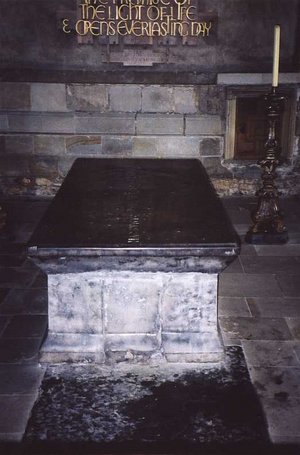Beda
| Acest articol (sau părți din el) este propus spre traducere din limba engleză!
Dacă doriți să vă asumați acestă traducere (parțial sau integral), anunțați acest lucru pe pagina de discuții a articolului. |
Venerabilul Beda (n. 672 - 25 Mai, 735) a fost un călugăr al Mănăstirii Northumbriane a Sfântului Petre din Wearmouth (astăzi parte din Sunderland), şi al Mănăstirii soră, Sfântul Paul, în Jarrow-ul modern. El este bine cunoscut ca autor şi erudit, a cărui lucrare cea mai cunoscută este Historia ecclesiastica gentis Anglorum (Istoria Bisericească a poporului englez), care i-a adus supranumele de Părinte al istoriei engleze. Sfântul Beda a scris lucrări în multe alte domenii, de la muzică şi sistemul muzical la comentarii la Scriptură. Prăznuirea lui se face în 25 Mai, 26, sau 27, în funcţie de izvoarele folosite la întocmirea calendarului.
Cuprins
Omul Beda
Aproape tot ceea ce se cunoaşte despre el, este o notiţă adăugată de el însuşi în Historia (v. 24), care spune că a fost dus la mănăstire la Wearmouth la vârsta de şapte ani, că a devenit diacon în al nouăsprezece-lea an, şi preot în al treizeci-lea an, rămânând preot până la sfârşitul vieţii. Nu s-a stabilit clar dacă avea sau nu origine nobilă. A fost instruit de către stareţii Benedict Biscop şi Ceolfrid, şi probabil i-a însoţit mai târziu în Jarrow în 682. Acolo şi-a petrecut timpul, având ca preocupări de căpătâi cititul, învăţatul şi scrisul, de asemenea fiind zelos în îndeplinirea îndatoririlor monahale.
Beda a devenit cunoscut ca „Venerabilul Beda” curând după moartea sa. Moaştele sale sfinte sunt aşezate într-un mormânt ridicat într-un capăt al Catedralei Durham, Anglia.
Bede's Writings
His works show that he had at his command all the learning of his time. It was thought that the library at Wearmouth-Jarrow was between 300-500 books, making it one of the largest in England. It is clear that Biscop made strenuous efforts to collect books on his extensive travels. Bede was proficient in patristic literature, and quotes from Pliny the Younger, Vergil, Lucretius, Ovid, Horace, and other classical writers, but with some disapproval. He knew Greek and a little Hebrew. His Latin is clear and without affectation, and he is a skilful story-teller.
Bede practiced the allegorical method of interpretation, and was by modern standards credulous concerning the miraculous; but in most things his good sense is conspicuous, and his kindly and broad sympathies, his love of truth and fairness, his unfeigned piety, and his devotion to the service of others combine to make him an exceedingly attractive character.
The Venerable Bede's commentaries on Holy Scriptures owed much to other patristic sources, as he often inserted long quotations from other Latin Fathers, especially Pope St. Gregory the Great, St. Augustine of Hippo, and St. Jerome. In addition to two books of homilies on the Gospel pericopes of the liturgical year, the great monk of Wearmouth's surviving works include verse-by-verse commentaries on the Acts of the Apostles, the Seven Catholic Epistles, and The Explanation of the Apocalypse. His commentaries on the Pauline Epistles are contained in The Biblical Miscellany. He also compiled St. Augustine's commentary on the Pauline Epistles into a single volume that follows their order in our present canon. His allegorical interpretations of the Old Testament survive in two works: On the Temple and On the Tabernacle.
Bede's writings are classed as scientific, historical, and theological. The scientific include treatises on grammar (written for his pupils), a work on natural phenomena (De rerum natura), and two on chronology (De temporibus and De temporum ratione). Bede made a new calculation of the age of the Earth and began the practice of dividing the Christian era into B.C. and A.D. Interestingly, Bede wrote that the Earth was round "like a playground ball," contrasting that with being "round like a shield."
Historia Ecclesiastica
The most important and best known of his works is the Historia ecclesiastica gentis Anglorum, giving in five books (about 400 pages) the history of England, ecclesiastical and political, from the time of Caesar to the date of its completion (731). The first twenty-one chapters, treating of the period before the mission of St. Augustine of Canterbury, are compiled from earlier writers such as Orosius, Gildas, Prosper of Aquitaine, the letters of Pope St. Gregory the Great (known as St. Gregory the Dialogist in the Byzantine East), and others, with the insertion of legends and traditions.
After 596, documentary sources, which Bede took pains to obtain, are used, and oral testimony, which he employed not without critical consideration of its value. He cited his references and was very concerned about sources of all his sources, which created an important historical chain. He is credited with inventing footnoting. (Due to his innovations like footnoting he was accused of heresy at the table of Bishop Wilfred. The actual accusation was for miscalculating the age of the world. His chronology was contrary to the calculation of the time. It is linked to footnoting because Bede cited another source in a note, rather than opining himself, showing a misunderstanding by others of what citing another source is.)
Other Works
His re-editing of the Bible was important, and was used by the Roman Catholic Church until 1966. He did not copy any one source, but researched from several sources to create single volume Bibles (highly unusual for the time—the Bible normally had circulated as separate books).
His other historical works were lives of the abbots of Wearmouth and Jarrow, and the life in verse and prose of St. Cuthbert of Lindisfarne. The most numerous of his writings are theological, and consist of commentaries on the books of the Old and New Testaments, homilies, and treatises on detached portions of Scripture. He also composed a number of hymns.
His last work, completed on his death-bed, was a translation into Anglo-Saxon of the Gospel of John.
Famous Quotation
- "Better a stupid and unlettered brother who, working the good things he knows, merits life in Heaven than one who though being distinguished for his learning in the Scriptures, or even holding the place of a doctor, lacks the bread of love."
- -St. Bede the Venerable
External links
- Ecclesiastical History of the English People, Book 1, L.C. Jane's 1903 Temple Classics translation.
- Bede's World: the museum of early medieval Northumbria at Jarrow
- Bede's Ecclesiastical History commentary from The Cambridge History of English and American Literature, Volume I, 1907–21.
- The Book of Hymns, Rhythms, and Various Prayers of the Venerable Bede
- Bede's Ecclesiastical History of England a revised translation with introduction, life, and notes by A. M. Sellar (from the Christian Classics Ethereal Library)
- Icon and Story of St. Bede
Categorii > Istoria Bisericii
Categorii > Istoria Bisericii
Categorii > Istoria Bisericii
Categorii > Liturgică > Sărbători > Sfinți
Categorii > Liturgică > Sărbători > Sfinți > Sfinți Părinți
Categorii > Liturgică > Sărbători > Sfinți > Sfinți celtici și anglo-saxoni
Categorii > Locuri > Ortodoxia pe țări
Categorii > Locuri > Ortodoxia pe țări > Ortodoxia în Europa Vestică > Ortodoxia în Regatul Unit
Categorii > Oameni
Categorii > Oameni
Categorii > Oameni
Categorii > Viața Bisericii > Monahism

